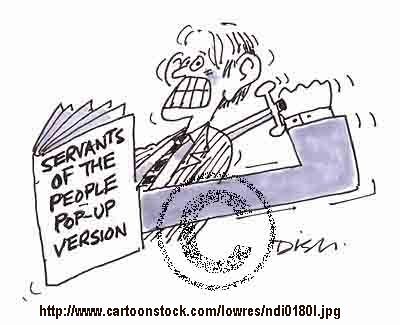
The White House and the Republican leadership met behind closed doors a couple of days ago to map out a political strategy to respond to high gas prices. This Reuters story outlines what they came up with. Basically, it is a strategy for maximum motion with minimum effect. Reduce "environmental restrictions" on refineries (surely by now a shibbolith, since these 'restrictions' have been eased and reduced over the past 5 years so much that they practically do not exist--and to the extent that they DO exist, they are not enforced); release supplies to from the strategic reserves (as analysis below demonstrates, oil is 'fungible' and an additional supply, unless it is a virtual glut, will merely add discounted oil to the input stream of the already inflated profit margins of the oilgopoly); direct the FTC to 'vigorously investigate' price-gouging (yeah, sure...nothing instills more confidence in me as a consumer than to know that the toothless watchdogs of the Bush Administration are on the job--we recall the excellent job they did with Enron); and to assure the public that the problem falls squarely in our laps (Frist's homily of 'no silver bullet' while encouraging reduced consumption rings as hollow as a pot-metal church bell. This is the same gang who eliminated enforced fuel standards and cut investments in mass transit).
WASHINGTON -
President Bush on Tuesday ordered a temporary suspension of environmental rules for gasoline, making it easier for refiners to meet demand and possibly dampen prices at the pump. He also halted for the summer the purchase of crude oil for the government's emergency reserve.
The moves came as political pressure intensified on Bush to do something about gasoline prices that are expected to stay high throughout the summer.
Bush said the nation's strategic petroleum reserve had enough fuel to guard against any major supply disruption over the next few months.
"So, by deferring deposits until the fall, we'll leave a little more oil on the market. Every little bit helps," he said. Wholesale gasoline futures prices for June delivery dropped 8 cents a gallon to $2.10 on the New York Mercantile Exchange immediately upon Bush's remarks.
Easing the environment rules will allow refiners greater flexibility in providing oil supplies since they will not have to use certain additives such as ethanol to meet clean air standards. The suspension of oil purchases for the federal emergency oil reserve is likely to have only modest impact since relative little extra oil will be involved.
The high cost at the pump has turned into a major political issue, with Democrats and Republicans blaming each other for a problem that is largely out of Congress' control. Republicans are worried that voters paying more than $3 per gallon would punish the party in power. Democrats want to make that happen.
Bush said that high gasoline prices are like a hidden tax on consumers and businesses, although he said the nation's economy was strong. He urged Congress to take back some of the billions of dollars in tax incentives it gave energy companies, saying that with record profits, they don't need the breaks. He urged lawmakers to expand tax breaks for the purchase of fuel-efficient hybrid automobiles.
The president said Democrats in the past have urged higher taxes on fuel and price caps to control fuel expenses, but he said neither approach works. Instead, he called for increased conservation, an expansion of domestic production and increased use of alternative fuels like ethanol.
Bush said high energy prices are disturbing.
"Our addiction to oil is a matter of national security concerns," the president said in a speech to the Renewable Fuels Association, which advocates alternate energy sources. "After all, today we get about 60 percent of our oil from foreign countries. That's up from 20 years ago, where about 25 percent of our oil came from foreign countries."
Bush said gasoline prices are expected to remain high throughout the summer and "that's going to be a continued strain on the American people."
Bush said the Federal Trade Commission, the Justice Department and the Energy Department were investigating whether the price of gasoline has been unfairly manipulated. The administration also contacted all 50 state attorneys general to offer technical assistance to urge them to investigate possible illegal price manipulation within their jurisdictions.
During the last few days, Bush asked his Energy and Justice departments to open inquiries into whether the price of gasoline has been illegally manipulated. It's unclear what impact, if any, Bush's investigation would have on prices that are near or at $3 a gallon or more. Asked if Bush had any reason to suspect market manipulation, White House press secretary Scott McClellan responded, "Well, gas prices are high right now, and that's why you want to make sure there's not."
The administration sent letters Tuesday to state attorneys general urging them to vigorously enforce state law "against any anticompetitive, anticonsumer conduct in the petroleum industry."
"Consumers around the nation have expressed concerns about what they have perceived as anticompetitive or otherwise unfair conduct by the world's major oil companies," said Attorney General Alberto Gonzales and Federal Trade Commission Chairman Deborah Platt Majoras. Their letter said federal agencies had substantially increased efforts to monitor, detect and prevent any violations of the law.
House Speaker Dennis Hastert, R-Ill., and Senate Majority Leader Bill Frist, R-Tenn., urged Bush in a letter Monday to order a federal investigation into any gasoline price gouging or market speculation.
"There is no silver bullet," Frist said Tuesday on ABC's "Good Morning America," but "we need to make sure that any efforts at price-gouging be addressed and addressed aggressively." Meanwhile, Frist said, consumers should take steps to conserve gasoline — drive at slower speeds, tune up car engines for maximum efficiency and carpool.
Senate Democratic leader Harry Reid of Nevada dispatched his own letter, calling for a multi-pronged approach to restrain gas prices.

No comments:
Post a Comment